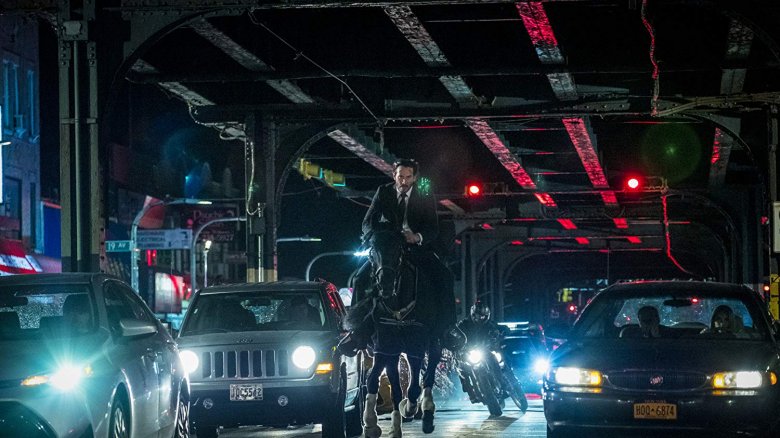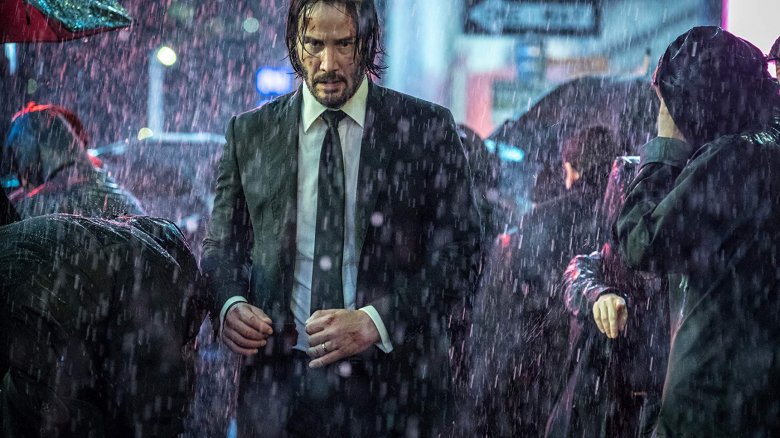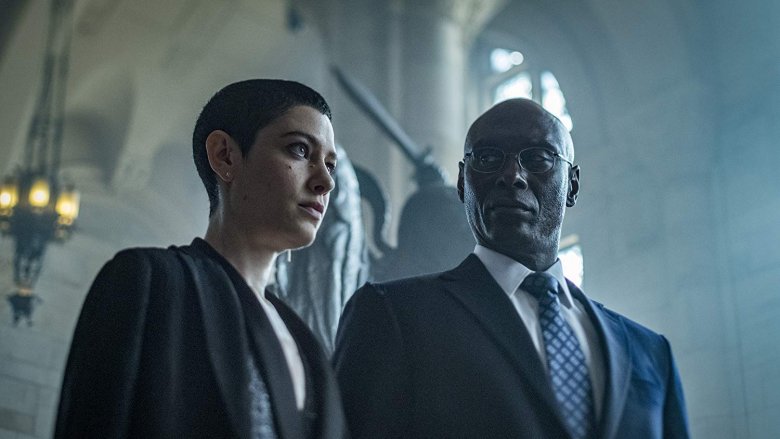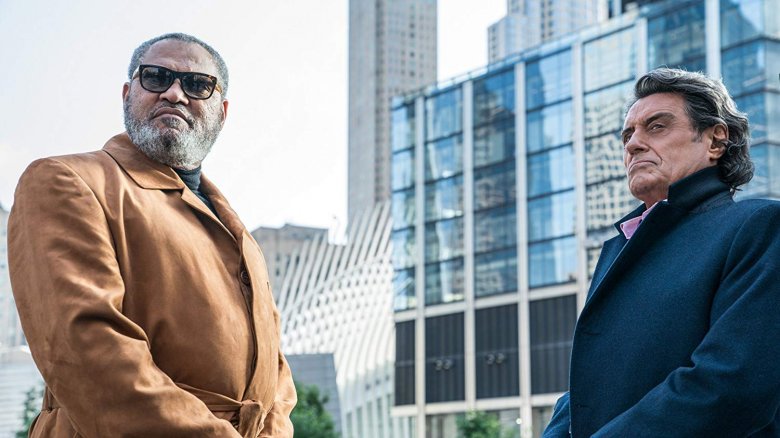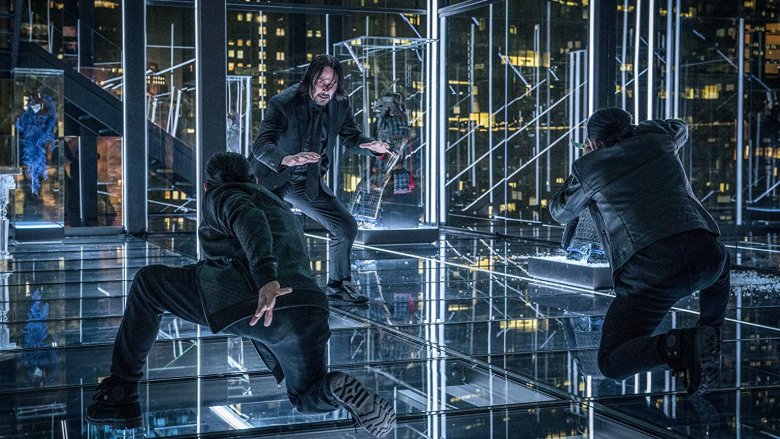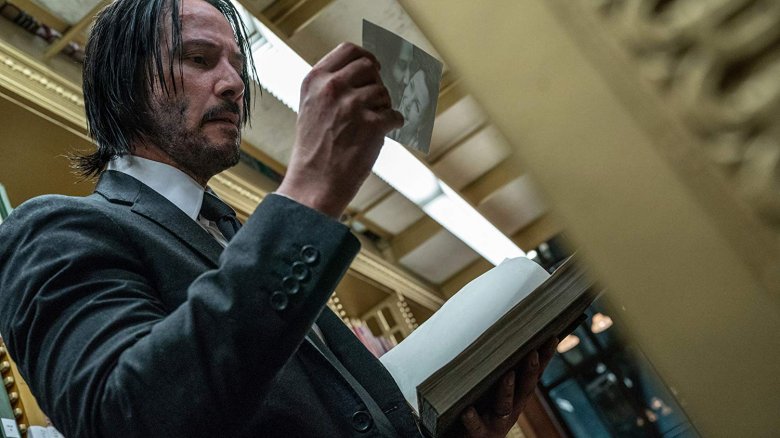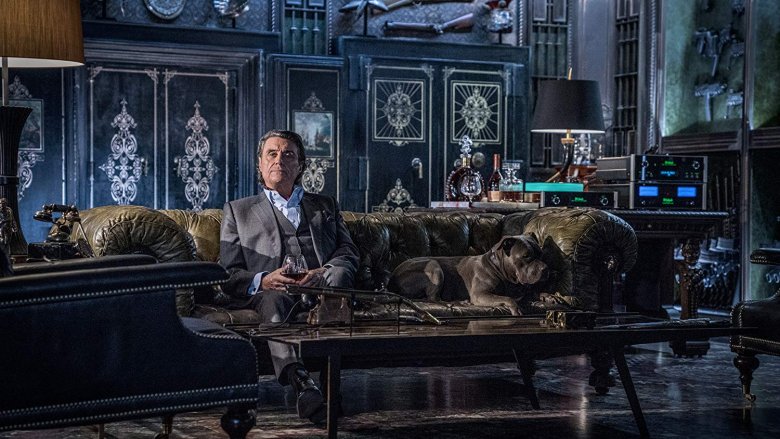The Ending Of John Wick: Chapter 3 - Parabellum Explained
The forever-brooding super assassin John Wick is back for a threequel. John Wick: Chapter 3 — Parabellum follows everyone's favorite dog-loving killing machine as he, well, does everything he did in the last two movies, but on a somewhat grander scale. This time, the so-called "Baba Yaga" is being pursued by essentially every other assassin in the game, a delicious twist from the closing moments of Chapter 2 prompted by Wick breaking the rules of the Continental, an exclusive hotel for assassins, by shooting a big deal crime lord on hotel property.
Wick's game-changing act of vengeance marks him as "excommunicado" and puts a $14M (and rising!) contract on his head, but as Parabellum makes abundantly clear, Wick is more than capable of defending himself. After this latest dizzying (and sometimes silly) thrill ride, viewers may be left wondering what that ending was really all about. Here's the ending of John Wick: Chapter 3 — Parabellum, explained.
The Wick formula works
If you've made it this far into the Wickverse, you know the score: John Wick flicks begin with ample evidence that Wick (Keanu Reeves) is the most efficient killing machine in the world. The thrust of Act 1 is always that Wick is god-like in this regard; it's almost like watching one of those flawless "No Deaths" tool-assisted video game speedruns. The man simply can't be stopped. Act 2 involves Wick travelling to complete a quest of some sort and is always the (relatively) slowest stretch, giving viewers a much-needed chance to catch their breath. Act 3 always kicks things back into high gear, with some cool world-building and mythology-expanding, and Wick triumphing fantastically, of course — but just barely.
Parabellum follows this satisfying formula, so the events of Act 3 don't come as a total surprise. The Elder (Saïd Taghmaoui), the bigwig in the High Table, a super-serious worldwide council of crime lords, kicks off the film's final act by making Wick "choose" between (1) killing Continental NYC manager and Wick ally Winston (Ian McShane) and living his remaining days as a High Table hitman or (2) dying in the Sahara. After a gruesome act of solidarity — slicing off his ring finger and giving his wedding ring to the Elder — Wick heads to the Continental, where a surprising switcheroo awaits him, courtesy of the High Table.
The 'deconsecration' twist
Every Wick fan knows that there are two rules in the Wickverse that carry serious consequences if they're broken: not honoring a "marker" that signals an assassin has to kill a key target, and, most importantly, conducting "business" (in other words, assassinating people) on any Continental property around the globe. In Chapter 3's closing act, a mysterious figure known as the Adjudicator (Asia Kate Dillon) voids the latter law, declaring the NYC Continental as "deconsecrated" in order to send heavily armored High Table thugs into the hotel. These super-soldiers are tasked with taking down John Wick, since Wick chose not to take down Winston, despite the whole cutting-off-his-own-ring-finger-to-prove-he'd-really-do-it thing.
This armored assault doesn't work, of course, and, after much fancily-choreographed grappling, Wick defeats the High Table goons and the Adjudicator's hired assassin (and Wick fanboy) Zero (Mark Dacascos), as well as his blade-happy crew. After the dust settles, the Adjudicator agrees to let Winston stay in the safety of the hotel, but lets Winston know that Wick is still very much a thorn in the High Table's side. What Winston does next is a bit ambiguous, but it sure looks like betrayal at first glance: On the roof of the Continental, Winston suddenly shoots Wick several times, causing him to fall to the alley below. So what gives? Why would Winston do such a thing, especially during a formally declared "parley" (i.e., temporary truce)?
Winston's betrayal?
Did Winston really intend to kill Wick on the roof? It's left unclear, but there's certainly an argument to be made that Winston would have just shot Wick in the head if he truly wanted him dead, instead of shooting him in the likely bullet-proofed suit he received from the Elder. Plus there's the Tick Tock Man (Jason Mantzoukas) all-too-conveniently waiting nearby to help escort Wick's body away, not to mention the exchange before Wick goes over the roof between Continental NYC concierge and fellow Wick ally Charon (Lance Reddick) and Winston, when Charon assures his boss that everything's "in place."
Winston's plan, it appears, was to fake Wick's death with the help of the Bowery King (Laurence Fishburne) and then use the Baba Yaga to try and take down the High Table. With this plan in mind, Wick's fall being somewhat slowed by awnings outside the Continental — a building Winston knows better than anyone — isn't just good fortune. Further evidence of this risky plan comes early, when Wick strategically shoots an underworld doctor in such a manner that it appears as if he was trying to kill him, but he's left alive. If Wick knows how to convincingly fake-kill somebody, Winston does as well. There's also the possibility that Wick was outfitted offscreen with a layer of body armor — which would also explain how he could be thrown through, like, a half-dozen glass display cases and still live — but that's just wild speculation.
Wick the pawn?
Bottom line: If Winston wants regime change in or a dismantling of the upper echelon of the world's greatest assassins, he knows the only man capable of overthrowing the High Table is Wick, the nigh-unkillable "boogeyman" every trained killer knows and respects. The real question is whether or not Wick — who genuinely seemed surprised when he was shot by Winston — was in on it. Did Wick fake his reaction? Did Wick and Winston work this all out offscreen, during, say, the "DECONSECRATED" montage featuring The Marvelous Mrs. Maisel-meets-Suicide Girls receptionists?
We don't know for sure, but it's a safe bet that Winston chose to surreptitiously save Wick's life by faking his death, at least temporarily. With no evidence of his demise, Wick's in the same place he was at the end of Chapter 2: excommunicated and wanted by every killer-for-hire in the Wickverse. But this time, Wick appears to be done running, and is likely eager turn the tide against the all-powerful High Table. As Charon puts it to Winston after Wick's rooftop tumble: "Well played, sir."
Wick is PO'd
After Winston's supposed betrayal, Wick's fate is unknown to the High Table until the Adjudicator sees that the super assassin's body has gone missing. In a twist that everybody and their pitbull saw coming, it turns out that Wick is alive, having found refuge in the Bowery King's new hideout. The Bowery King, sliced seven times by Zero — a callback to when he hooked Wick up with seven bullets back in Chapter 2 — tells Wick he's "pissed off." Wick agrees with that sentiment, setting up what's sure to be another beautifully choreographed and absurdly violent installment in John Wick: Chapter 4.
The third act also reveals that the title "Parabellum" — from the Latin adage "Si vis pacem, para bellum," meaning "If you want peace, prepare for war" — isn't necessarily a reference to the "war" between Wick and the world's elite assassins in this latest installment. Parabellum instead sets up the war to come against the High Table, and it looks like Wick will get more help the next time around, probably even from Mr. "We Are New York City" himself, the mercurial Winston. The Bowery King and his considerable influence in the underground are also sure to be a major factor in Chapter 4, which will almost certainly happen, considering how successful the Wick films have been with critics and at the box office.
What's up with Wick 4?
Nothing's official regarding John Wick: Chapter 4 yet, but director Chad Stahelski told Entertainment Weekly in 2018 that the Wick well hasn't run dry. "If people go see the movie, and it makes money, and they came back to us, Keanu and I have ideas for days," he told the publication.
Interestingly enough, Stahleski later told Indiewire that, despite all appearances, the end of JW3 wasn't necessarily intended as a cliffhanger. The trusty Wick formula, according to Stahleski, demands that when the end credits roll, Wick is either left alive and hunted yet again by the deadliest people on the planet, or dead as a doornail (i.e., no "riding off into the sunset"). "Do you think he's going to ride off into the f—ing sunset? He's killed 300 f—ing people and he's just going to [walk away], everything's okay?" Stahelski said. "If you're this f—ing guy, if this guy really exist[ed], how is this guy's day going to end? He's f—ed for the rest of his life. It's just a matter of time."
The somewhat ambiguous ending to Chapter 3 will likely get cleared up in Act 1 of JW4, but until then, our artisanal gold coins are on Winston waging a "skirmish," with Wick's help, on the seemingly invincible High Table. It is Winston, you'll recall, who uttered "Si vis pacem, para bellum" — which is as much an incitement as it is a strategy.
